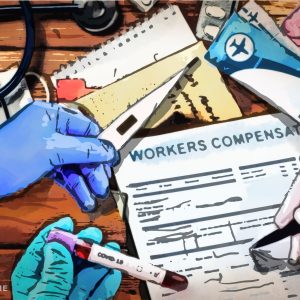A plea for protective gear for healthcare workers
Healthcare workers at the front line of the Covid-19 pandemic are at high risk of infection and death. Sufficient personal protective equipment and logistical support are essential.
Author:
20 April 2020

No one was prepared for the South African government’s Covid-19 lockdown, neither health management nor the health caregivers on the front line who deal with patients coming in and out of health facilities.
The World Health Organization says the hazards that put such workers at risk of infection include “pathogen exposure, long working hours, psychological distress, fatigue, occupational burnout, stigma, and physical and psychological violence.” Protective gear is essential to keep them safe.
But all facilities, including hospitals, clinics and forensic departments, went into the lockdown without the proper personal protective equipment: N95 masks, surgical masks, A60 suits, eye-protection goggles, hair covers, long-sleeved gowns, plastic arm sleeves, water-resistant aprons, non-sterile high-risk gloves, surgical scrub suits and medical knee-high rubber boots. Health workers were thrown into the deep end without being tested and screened for other underlying sicknesses. However, those found with tuberculosis, for example, could be released from duty and sent home.
Lack of transport
Transport is not provided for workers during this time. Those who do not have their own private transport have to use public transport, which makes them prone to catching the coronavirus together with the other people they are travelling with in the same taxi.
This is made worse by the health management’s refusal to authorise departmental cars, which are already in various facilities, to be used in ferrying workers to and from work. Health workers are in the precarious situation of harbouring the Covid-19 virus from work owing to no protective clothing or safe transportation being provided for them.
Moreover, the shortage of public transport as a result of the lockdown generates a situation whereby employees are now faced with a no work-no pay policy, because of arriving late or not at all at work.
Related article:
This just shows how Eastern Cape’s health system was and is still not ready to curb this virus. Instead, health workers in the province are forced to be the ones carrying this virus to communities. They are called essential workers and yet they are being sent to war without weapons by their very employer.
The past few weeks have been a struggle between trade unions within the Department of Health and the management of health. Unions fighting for the safety of workers are bringing forward proposals of how this can be done so that everyone is safe from the virus. Unfortunately, they are still struggling to put those proposals into practice and health workers are suffering the consequences.
What can be done?
The public health department must provide proper personal protective equipment for all health employees. Health workers must also be provided with safe, reliable transport to and from work. The treatment given to employees must be the same and equal for all employees. It is noticed that doctors are being given better treatment than their junior colleagues, although all are employees of the same employer.
All health employees must be given free Covid-19 laboratory testing. There should be a provision for a Covid-19 danger allowance for all health workers. A special sick leave should be given without forcing staff to take from their annual leave and sick leave, should health workers present with symptoms of flu. And the health department should learn from the ordeal of this pandemic on how crucial the work of the community health worker is in delivering healthcare services accurately and without fail to patients. It should use this pandemic as an opportunity to rope them into the department, and be directly employed by the Department of Health and enjoy all the benefits, including a dignified living wage.
Related article:
The public health sector should also be equipping community healthcare workers with basic education on Covid-19 and using their engagement skills as a tool to educate communities about the virus. It should be educating communities on how to protect and respond to this pandemic, and the tools they should employ to ease the panic that comes as a result of this disease.
The struggle of communities, especially those of the working class and shack settlements, in not understanding how to use masks and gloves is also a crisis that can be addressed by community healthcare workers when providing health education in these particular communities.
Mzikazi Nkata works in the public health sector as a forensic pathology officer and is a shop steward in the National Union of Public Service and Allied Workers (Nupsaw).


